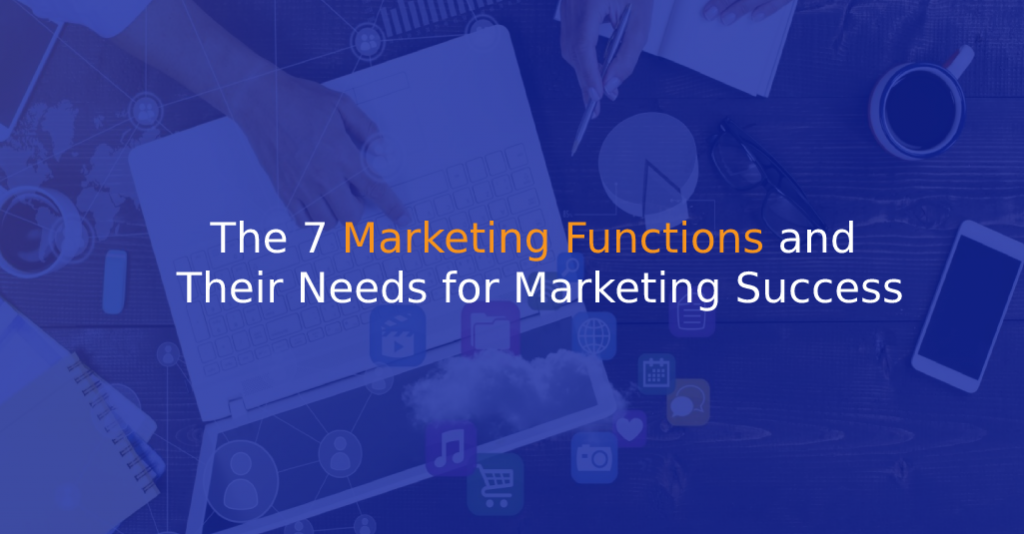Marketing is critical to the success of your business, but it comprises more than just advertising your product or service. Marketing information management, finance, product and service management, pricing, promotion, selling, and distribution are the seven marketing functions that guide your team’s activities.
This blog will go through these roles and present practical tools to assist you in developing a strong marketing plan.
Why Do You Need to be Familiar with All Seven Marketing Functions?
You may be asking why you need to learn each of the marketing functions. You could also be wondering how they all relate to marketing; aren’t some of them the responsibility of other teams?
All teams must collaborate for successful functional marketing. Each marketing function influences the next, and success necessitates a comprehensive approach. For example, your marketing communications have an impact on the performance of your sales staff, and your distribution strategy has an impact on whether your promotions are effective.
As we go through each marketing function, you’ll see how they all interact together to give your marketing plan more depth.
Top 7 Marketing Functions
Ready to go deeper into marketing roles and how to incorporate them into your strategy? Continue reading for a summary of each!
1. Marketing information management
Functional marketing is based on solid facts. Marketing information management collects and reports on data systematically related to your marketing processes. This information comprises:
- Identifying your target market.
- Understand your target market.
- Performing a SWOT analysis (strengths, weaknesses, opportunities, and threats).
- Examining your competitors

You could obtain this information by,
- Surveys
- Social media
- Conducting customer reviews of your product as well as competitor goods.
- Internal data, for example, website traffic reports.
- Competitive research tools
- Your sales team, who is in direct contact with your consumers.
We are concentrating initially on marketing information management because your data will guide all other marketing operations, from pricing to promotion and distribution.
Because your marketing data is so important, you’ll need a system for organizing, evaluating, and distributing your results across teams.
Make an outstanding remark in your business with the best digital marketing services!
2. Financing
To function, all businesses must have funding. While your firm will require finances to get started, you and your marketing team will also require ongoing financing to support your marketing efforts.
The information gathered during the marketing information management stage will assist you in obtaining this funding. You should also examine data from previous campaigns, particularly metrics that relate to your overall business goals and key performance indicators (KPIs).
3. Product and service management

All marketing methods revolve around your product or service. After all, for your marketing efforts to be effective, you must have a high-quality product.
While research and development teams are in charge of developing new items, this stage is also critical for marketing.
As a marketing leader, you should collaborate closely with your research and development team to ensure that your company generates an offering that will resonate with your target audience and that you continue to learn from your target audience after the product is launched.
Best professional and experienced digital marketers are here to help your business succeed in a short time!
4. Pricing
Pricing is one of the most important aspects of marketing since it impacts your audience’s readiness to buy. Setting your pricing, on the other hand, is a complex process impacted by psychology and client perceptions.
To comprehend the price difference, you must analyze the worth of your item as well as the aspects that impact worth, such as:
- Product quality
- Product benefits
- Post-purchase support
- Cause-driven business decisions
- Branding that resonates
- Brand community
- Exclusivity
- Convenience
- Customer experience
When these variables are considered, it is easy to see why higher-end brands command greater prices.
The price you establish is determined by your market, company objectives, marketing strategy, and target audience. Consider the following factors before deciding on a price:
- Your competitive landscape
- The cost of production
- The value your offering brings
- Your branding
Your price approach will be influenced by the other marketing functions. Meanwhile, marketing and sales aid in the establishment of branding.
5. Promotion

The role of marketing that most people think of initially is promotion. After all, getting your service in front of your target audience and explaining its worth to them is a big component of marketing.
All communications used to assist your target audience find and learning more about your service are included in the promotion stage. Among the promotional strategies are:
- Creating a website
- Search engine optimization for your website (SEO)
- Implementing advertising campaigns
- Using social media to communicate
- Collaboration with influencers Publishing relevant content
- Increasing word-of-mouth
- Organizing events
Most organizations will utilize a combination of communication channels to achieve the best outcomes. Your platform selection should be in line with your marketing objectives, budget, competitive environment, and target demographic.
Bonus points: A strong promotional plan will stimulate two-way contact and the development of relationships with your target audience. After all, brand-customer interactions promote loyalty, and consumers who remain around will benefit your company.
Looking for result-driving digital marketing strategies to boost your business growth?
6. Selling
You must close the transaction once you have communicated the value of your product. While your sales staff may eventually achieve this aim, selling remains an important marketing role.
Your marketing plan should engage clients at each stage of the buyer’s journey, nurturing them down the funnel toward a sale. You may do this by utilizing a diverse set of communication channels and tailoring your content to each stage.
7. Distribution
You need to get your offering in front of customers now that you’ve developed a strong product, communications strategy, and sales funnel. Your distribution strategy includes where you sell your goods and how you deliver them to clients. Channels of distribution might include:
- Ecommerce stores
- In-person stores
- Wholesalers
- Warehouses and transportation to stores
- Shipping methods
Marketing distribution is important since it serves the aim of your messaging. You’ve worked hard to convince people to buy your goods, and now you must follow through.
Furthermore, the marketing data you collect impacts your distribution plan. Both must collaborate to achieve the best results.
Discover How Digital Tactics Will Influence All Marketing Functions.
Are you ready to put your newly acquired knowledge of marketing functions to use? You may use digital marketing to gather information about your target audience, do competitive research, and explain your product to prospective purchasers.



